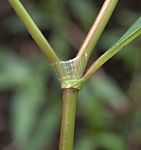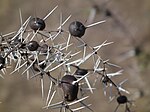Stipler
Stipler även kallade amfigastrier eller bukblad[1] är bladlika bildningar i par vid bladskaftets bas. Stipelslida är en kring stjälken sluten rörlik slida som går uppåt från ledknutarna; särskilt hos slideväxterna.[2] Stipler kan också vara omvandlade till stipeltornar som då alltid sitter i par vid en bladbas. När bladet fälls sitter stipeltornarna kvar, men då parvis runt ett bladärr eller runt ett nytt skott.
Stipler hos ros.
Stipelslida hos åkerpilört.
Referenser
- ^ Carlquist, Gunnar, red (1930). Svensk uppslagsbok. Bd 5. Malmö: Svensk Uppslagsbok AB. sid. 295
- ^ Krok, Th. O. B. N.; Almquist, S. (1994). Svensk flora, fanerogamer och ormbunksväxter. Jonsell, Lena och Jonsell, Bengt (Tjugoåttonde upplagan). Liber Utbildning. ISBN 91-47-04992-8
Media som används på denna webbplats
Författare/Upphovsman: Nevit Dilmen (talk), Licens: CC BY-SA 3.0
Flora of Tanzania. The Whistling Thorn (Acacia drepanolobium)
A mouthful of that could change your perspective.
This species of acacia grows two kinds of thorns. The main defense is provided by pairs 5cm long arranged nearly at a right angle. Smaller stipular spines grow between the pairs of big thorns. These emerge from hollow galls, bulbous swellings 2 to 3cm across. One of four different species of ant lives in each of these igloos, which they open up by cutting holes into them. A dying bush whistles as the wind blows over these entrances.
Most acacias make toxins that it rushes to leaves that are under attack by browsers. The whistling thorn doesn't. It is infested with stinging ants that swarm out and prepare to bite anything they can when the branch is disturbed. Most browsers seem to avoid infested bushes, perhaps because the ants stink of formic acid.Författare/Upphovsman: Martin Olsson (mnemo on en/sv wikipedia and commons, martin@minimum.se)., Licens: CC BY-SA 3.0
Bilden visar en stipelslida på en sv:Åkerpilört.
Författare/Upphovsman: Rabe!, Licens: CC-BY-SA-3.0
Young leaves of a garden rose, image created by myself in spring 2005, GNU-FDL









